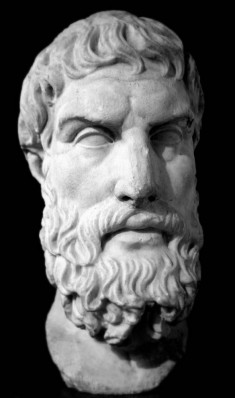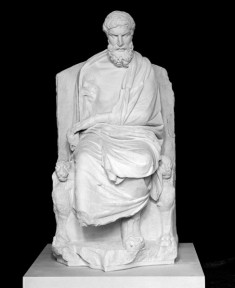| Epicurus | |
|---|---|
 |
|
| Greek Philosopher | |
| Specialty | Epicureanism |
| Born | Feb. 4, 341 BC Samos, Athens |
| Died | 270 BC (at age 72) Athens |
| Nationality | Greek |
Epicurus remains one of the most recognized figures of Greek antiquity. He was a great philosopher who had a significant number of followers. However, as is the case with so many people from Greek antiquity, much of his writings have been lost. Epicurus had compiled roughly 300 written works and mostly all of them are lost or only exist in fragments while some have been preserved due to the efforts of his followers.
The Life of Epicurus
Epicurus was born in February in the year 341 B.C. We know quite a bit more about his early life than we do about other philosophers of his time. His education as an adolescent was under the tutelage of Pamphilus, who was a follower of Plato’s theories.
At the age of 18, Epicurus served in the military for two years. Upon graduation, he studied under Nausiphanes and then started his own teaching career. After a rocky beginning at Mytilene, he ventured out to Lampsacus where he started his own school called the Garden. The location of his school was near both the Stoa and the Academy, both famous learning institutions at the time.
The School of Epicurus
Epicurus promoted the notion one should always seek to live a happy, stress free, and tranquil life. The means in which to accomplish such a life would be to eliminate fear and pain from one’s life. Obviously, this could not be achieved in a short time so it would take a great deal of concentrated effort and study to reach the desired result.
The school that Epicurus founded was a somewhat informal one that stressed community and friendship above all else. There were hierarchies in the school, however, and levels of formal progression did exist. Despite the very novel approach the school employed, it was not one known for having a large amount of followers. Those who were followers of Epicurus did embrace his teachings and sought to preserve them after he was gone. Granted, there is some confusion over the core of his teachings.
The Philosophy of Epicurus
 The philosophy of Epicurus was known as, not surprisingly, Epicureanism. Epicureanism was rooted in the belief in atomic materialism, which was a philosophical mindset that stressed the only true reality is one based on matter and empty space. To say Epicurus did not believe in superstitions would be an understatement. He truly loathed concepts associated with divine intervention and superstition.
The philosophy of Epicurus was known as, not surprisingly, Epicureanism. Epicureanism was rooted in the belief in atomic materialism, which was a philosophical mindset that stressed the only true reality is one based on matter and empty space. To say Epicurus did not believe in superstitions would be an understatement. He truly loathed concepts associated with divine intervention and superstition.
Epicurus also promoted the notion that life should always entail a search for pleasure. Pleasure is often confused with pure hedonism, which is most certainly not what Epicurus was promoting.
Rather, he connected pleasure, true pleasure, with the concept of living the good life. Specifically, that meant someone must live in a modest manner. He said that a person should always seek to forever expand one’s greater knowledge of how the world works. In doing so, a person can limit false and useless desires because they have not truly gained insight into what is really important in life.
The Antithesis Struggle
Epicureanism was considered a reaction to Platonism and, more significantly, it was dubbed an opponent to stoicism. Platonism was rooted very heavily in the philosophy of Plato and all its derivatives. Essentially, it was rooted in gaining an understanding of the realistic world you could see as well as drawing an understanding of the invisible that was not always so perceptible.
Stoicism was about the suppression of emotions. A philosophy rooted in the search for pleasure would be utterly removed from something as bland as stoicism.
Epicurus promoted the social contract and believed that a good and just society was one in which people aspired to neither cause nor receive harm.
Death of Epicurus
Epicurus had suffered from kidney stones throughout much of his life. This did cause him a great deal of pain and suffering. Eventually, he died from complications related to this issue after many years of suffering. In 270 B.C., he passed away at the age of 72.